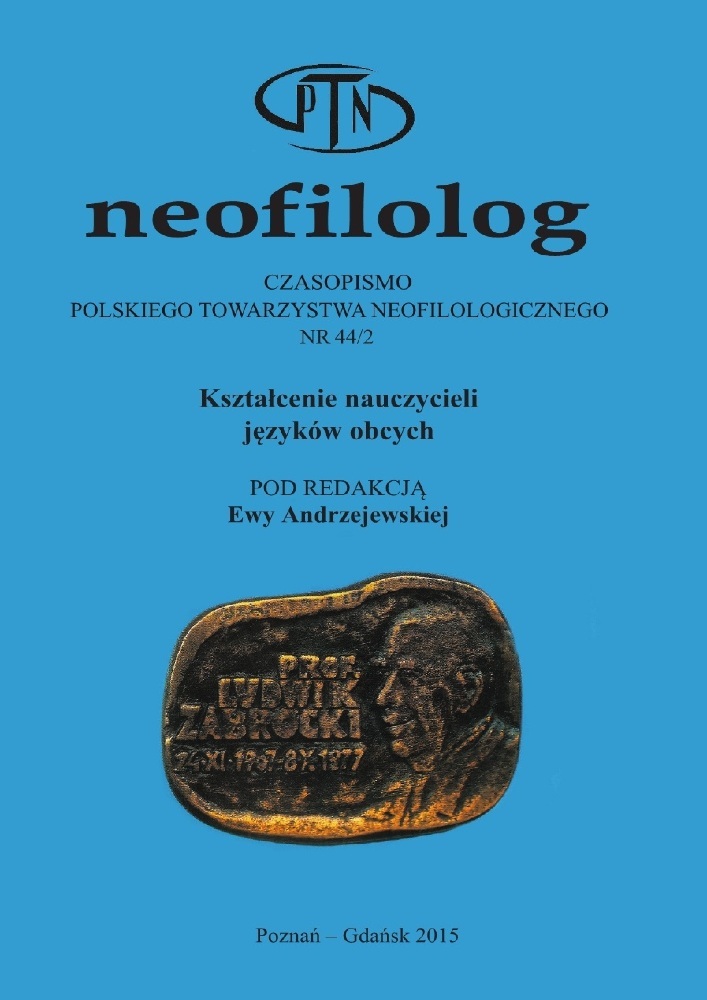Abstrakt
The job of the teacher of Language for Specific Purposes (LSP) requires the ability to teach learners of diverse profiles. Diversity of target groups in training entails diversity of language and learning needs. This paper aims to answer the question: how should LSP teachers be educated so that they can fulfil these needs and expectations? It is suggested that this can be done by preparing and implementing a suitable teaching programme which takes into account the specific character of different educational contexts. The reflections presented here are based on analysis of the Polish educational situation in LSP training. On the basis of these observations, several practice-oriented proposals will be formulated, which could be implemented in the process of language teacher training. Consideration is given, among other issues, to the pedagogical instruction that future LSP teachers need (which depends on the educational context of their future work), the scope of specialist knowledge in the given field that they will find indispensable, and the amount of knowledge of discourse and genre analysis with which they have to be equipped.Bibliografia
Abbot, G. 1983. „Training teachers of EST: Avoiding orthodoxy”. The ESP Journal 2(1): 33-36.
Arcaini, E. 1988. „Epistemologia dei linguaggi settoriali” (w) Il linguaggio delle scienze (red. G. Freddi). Brescia: La Scuola: 29-44.
Askenhave, I., Swales, J. M. 2000. „Genre identification and communicative purpose: A problem and possible solution”. Applied Linguistics 22: 195-212.
Bhatia, V. K. 1993. Analysing Genre – Language Use in Professional Settings. London: Longman.
Candlin, C. 2006. „Accounting for Interdiscursivity: Challenges to Professional Expertise” (w) New Trends in Specialized Discourse Analysis (red. M. Gotti, D. S. Giannoni). Bern: Peter Lang: 21-45.
Dudley-Evans, T., St John, M. J. 1998. Developments in ESP. A multi-disciplinary approach. Cambridge: Cambridge University Press.
Duszak, A., Fairclough, N. 2008. Krytyczna analiza dyskursu: interdyscyplinarne podejście do komunikacji społecznej. Kraków: Universitas.
Ewer, J. R. 1983. „Teacher training for EST: Problems and methods”. The ESP Journal 2(1): 9-31.
Gajewska, E. 2005. „Apprendre DU français pour perfectionner sa compétence professionnelle: cours sur objectifs spécifiques visant une compétence linguistique limitée”. Synergies Pologne 2005 (2): 120-124.
Gajewska, E., Sowa, M. 2014. LSP, FOS, Fachsprache. Dydaktyka języków specjalistycznych. Lublin: Werset.
Galian, C. 2004 „Disciplines scientifiques et FOS”. Le Français dans le monde. Recherches et applications: Numéro spécial de janvier, 2004: 75-80.
Huckin, T., Olsen, L. 1984. „On the use of informants in LSP discourse analysis” (w) Reading for professional purposes (red. A. Pugh, J. Ulijn). London: Heinemann: 120-129.
Hutchinson, T., Waters, A. 1987. English for Specific Purposes. A Learning-centred Approach. Cambridge: Cambridge University Press.
Krajka, J. 2007. English language teaching in the internet-assisted environment. Issues in the use of the Web as a teaching medium. Lublin: Wyd. UMCS.
Lehmann, D., Moirand, S., Mariet, F., Mariet, J. 1980. Lecture fonctionnelle de textes de spécialité. Paris: Didier-Crédif.
Mamet, P. 2002. „Relacja pomiędzy kompetencją językową a kompetencją merytoryczną na przykładzie języka biznesu” (w) Języki specjalistyczne 2: Problemy technolingwistyki (red. J. Lewandowski). Warszawa: KJS WLSiFW UW: 141-151.
Mangiante, J.-M., Parpette, Ch. 2004. Le français sur Objectif Spécifique: de l’analyse des besoins à l’élaboration d’un cours. Paris: Hachette.
Mezzadri, M. 2003. I ferri del mestiere. (Auto)formazione per l’insegnante di lingue. Perugia: Edizioni Guerra/Soleil.
Mourlhon-Dallies, F. 2008. Enseigner une langue à des fins professionnels. Paris: Didier.
Richer, J.-J. 2008. „Le français sur objectifs spécifiques (F. O. S.): une didactique spécialisée?”. Synergies Chine 3: 15-30.
Scollon, R. 2001. Mediated discourse: The nexus of practice. London/New York: Routledge.
Sowa, M. 2011. D’une activité pédagogique à l’activité professionnelle. Le cheminement vers la compétence. Lublin: Towarzystwo Naukowe KUL.
Swales, J. M. 1990. Genre Analysis. English in Academic and Research Settings. Cambridge: Cambridge University Press.
Swales, J. M. 2004. Research genres: Explorations and Applications. Cambridge: Cambridge University Press.
Licencja
Prawa autorskie (c) 2019 Elżbieta Gajewska, Magdalena Sowa

Utwór dostępny jest na licencji Creative Commons Uznanie autorstwa – Bez utworów zależnych 4.0 Międzynarodowe.
Przedstawiany utwór (artykuł) upubliczniany jest na podstawie umowy z autorem i na licencji Creative Commons Attribution-NoDerivatives 4.0 International (CC BY-ND 4.0).
Użytkownicy mają obowiązek podania wraz z rozpowszechnionym utworem, informacji o autorstwie, tytule, źródle (odnośniki do oryginalnego utworu, DOI) oraz samej licencji;
- bez tworzenia utworów zależnych,
- utwór musi być zachowany w oryginalnej postaci.
Uniwersytet im. Adama Mickiewicza w Poznaniu zachowuje prawo do czasopisma jako całości (układ, forma graficzna, tytuł, projekt okładki, logo itp.).
